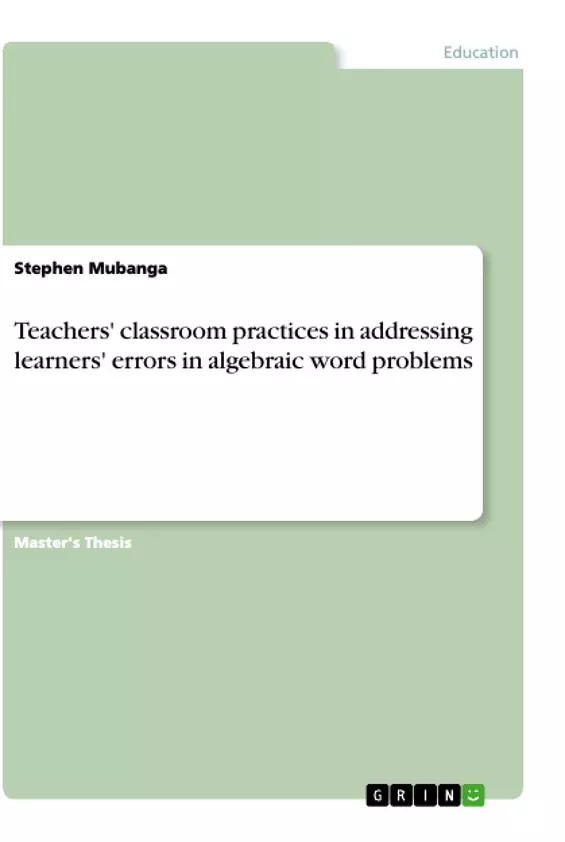The study explored teachers’ classroom practices in addressing learners’ errors regarding how they engaged grade eight learners in reading; how they probed learners’ understanding; and what they did to enhance learners’ process skills and encoding abilities in algebraic word problems. Five teachers and twenty five learners (in five focus groups discussions of five members each), at three secondary schools in Isoka district of Muchinga province, Zambia were purposively sampled to participate in the study. The study used a qualitative approach which followed a descriptive case study design. Data collection was done using lesson observations, semi-structured interviews, document analysis and focus group discussions. To capture observations and interviews in totality, video and audio recordings were used respectively. Thematic analysis was used to analyse data. The five performance strategies of solving word problems by Newman namely; reading ability, comprehension ability, transformation ability, process skills and encoding ability guided the analysis of data.
The study was guided by the following research questions:
How do teachers engage learners in reading algebraic word problems?
How do teachers probe learners’ understanding of algebraic word problems?
What do teachers do to enhance learners’ process skills and encoding abilities in algebraic word problems?
Inhaltsverzeichnis (Table of Contents)
- CHAPTER 1
- INTRODUCTION
- 1.1 Overview
- 1.2 Background of the study
- 1.2.1. Poor learner performance in mathematics and curriculum revision
- 1.2.2. Teachers' classroom practices in algebra
- 1.2.3. My personal experience
- 1.3 Statement of the problem
- 1.4 Purpose of the study
- 1.5 Study objectives
- 1.5.1 General objective
- 1.5.2 Specific objectives
- 1.6 Research questions
- 1.7 Significance of the study
- 1.8 Scope of the study
- 1.8.1 Delimitation of the study
Zielsetzung und Themenschwerpunkte (Objectives and Key Themes)
This dissertation explores the classroom practices of teachers in addressing learners' errors in algebraic word problems. The study aims to investigate how teachers engage grade eight learners in reading, probe their understanding, and enhance their process skills and encoding abilities in solving algebraic word problems.
- Teachers' classroom practices in addressing learners' errors in algebraic word problems
- Engagement of learners in reading and understanding algebraic word problems
- Teachers' strategies in probing learners' understanding of algebraic word problems
- Teachers' approaches to enhance learners' process skills and encoding abilities in solving algebraic word problems
- The impact of teachers' classroom practices on learners' ability to solve algebraic word problems
Zusammenfassung der Kapitel (Chapter Summaries)
Chapter 1 provides an overview of the study, including the background, statement of the problem, purpose, objectives, research questions, significance, and scope of the research. This chapter establishes the context for the investigation and highlights the need for exploring teachers' classroom practices in addressing learners' errors in algebraic word problems.
Schlüsselwörter (Keywords)
This research focuses on the core concepts of algebraic word problems, teachers' classroom practices, learners' errors, performance strategies, reading ability, comprehension ability, transformation ability, process skills, and encoding ability.
Frequently Asked Questions
What are Newman's five performance strategies?
They are: 1. Reading ability, 2. Comprehension ability, 3. Transformation ability, 4. Process skills, and 5. Encoding ability.
How do teachers address learners' errors in algebra?
Teachers use classroom practices like probing understanding, engaging students in reading, and enhancing their encoding abilities to solve word problems.
What is "encoding ability" in mathematics?
It is the ability of a learner to represent the final mathematical solution in an appropriate written form or context.
Why do students struggle with algebraic word problems?
Common issues include poor reading comprehension, difficulty transforming words into mathematical symbols, and weak process skills.
What was the methodology of the Isoka district study?
The study used a qualitative approach with a descriptive case study design, including lesson observations, interviews, and focus group discussions.
- Quote paper
- Stephen Mubanga (Author), 2020, Teachers' classroom practices in addressing learners' errors in algebraic word problems, Munich, GRIN Verlag, https://www.grin.com/document/1133136



